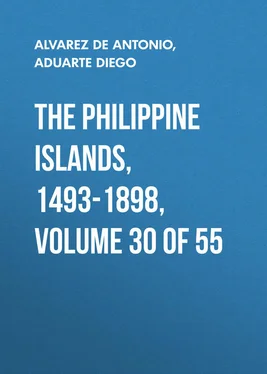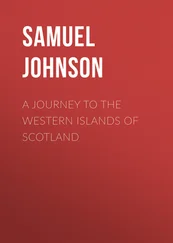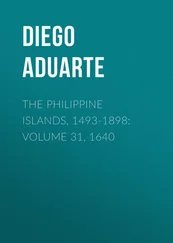Antonio Alvarez de Abreu - The Philippine Islands, 1493-1898, Volume 30 of 55
Здесь есть возможность читать онлайн «Antonio Alvarez de Abreu - The Philippine Islands, 1493-1898, Volume 30 of 55» — ознакомительный отрывок электронной книги совершенно бесплатно, а после прочтения отрывка купить полную версию. В некоторых случаях можно слушать аудио, скачать через торрент в формате fb2 и присутствует краткое содержание. Жанр: foreign_antique, foreign_prose, Историческая проза, на английском языке. Описание произведения, (предисловие) а так же отзывы посетителей доступны на портале библиотеки ЛибКат.
- Название:The Philippine Islands, 1493-1898, Volume 30 of 55
- Автор:
- Жанр:
- Год:неизвестен
- ISBN:нет данных
- Рейтинг книги:4 / 5. Голосов: 1
-
Избранное:Добавить в избранное
- Отзывы:
-
Ваша оценка:
- 80
- 1
- 2
- 3
- 4
- 5
The Philippine Islands, 1493-1898, Volume 30 of 55: краткое содержание, описание и аннотация
Предлагаем к чтению аннотацию, описание, краткое содержание или предисловие (зависит от того, что написал сам автор книги «The Philippine Islands, 1493-1898, Volume 30 of 55»). Если вы не нашли необходимую информацию о книге — напишите в комментариях, мы постараемся отыскать её.
The Philippine Islands, 1493-1898, Volume 30 of 55 — читать онлайн ознакомительный отрывок
Ниже представлен текст книги, разбитый по страницам. Система сохранения места последней прочитанной страницы, позволяет с удобством читать онлайн бесплатно книгу «The Philippine Islands, 1493-1898, Volume 30 of 55», без необходимости каждый раз заново искать на чём Вы остановились. Поставьте закладку, и сможете в любой момент перейти на страницу, на которой закончили чтение.
Интервал:
Закладка:
Another item ought to be placed with these, which is the expense for the islands of Moluco. These were possessions of the crown of Portugal, which consumed in supporting and defending them great sums of ducados and many soldiers; but finally it lost them, and the Dutch gained them. By agreement of the two crowns, Governor Don Pedro de Acuña regained possession of them (as I have related); and as it was evident that the crown of Portugal could not defend them on account of the great expense required therefor, those islands were committed, in the year 1607, to the governor of Philipinas. In this must be considered several things. First, that these islands of Moluco do not belong to those which are called Philipinas, nor are they included in that group. Second, that at present they are the property of the Portuguese crown, but are in possession of the Castilian crown for the purpose of protecting, maintaining, and defending them; on this account, the commerce in cloves is left to India, as it was before. Third, that the Philipinas and the citizens of Manila do not obtain or possess any advantage or benefit from Moluco, or anything else besides the continual trouble of succoring and provisioning its forts; for the clove-trade belongs to the Portuguese, and there is no other commerce in those islands. Fourth, that since the day when the governor of Philipinas and the crown of Castile took charge of Moluco, the crown of Portugal has saved more than 400,000 pesos, the cost which it would have incurred in maintaining Moluco, estimated on the basis of what it now costs Castilla for that – although Manila, which is the place where provision is made for those islands, is so near them. Fifth, that for these reasons it is evident and plain that what is spent for the islands of Moluco should not be charged to the Philipinas; nor even should the crown of Castilla pay it, but rather that of Portugal, which is the proprietary owner of Moluco, and has the benefit of the clove-trade. Consequently, whatever is received from that trade must be placed to the credit and acquittance of the Philipinas, against the amount charged to them. Sixth, and last, notice the [items of] the annual expenses of the Moluco Islands: for salaries, 97,128 pesos; provisions, considering the total number of people, will average 30,000 pesos a year; for the ecclesiastical ministrations and the management of the royal treasury, the expense will reach 4,000 pesos; and for naval affairs and shipyards, 100,000 pesos – since in order to send every year the usual supplies, and to furnish extraordinary aid when occasion demands, the armed ships are necessary which are always kept at Manila. Thus the cost of the islands of Moluco comes to more than 230,000 pesos each year; deducting this from the 256,000 which remain charged to the Philipinas, only 26,000 pesos. This is an amount unworthy of consideration, even if the islands were of no more use than to augment the grandeur of this crown; but granting that they possess the advantages that I have mentioned, the loss, cost, and expense is nothing; and it remains abundantly proved how necessary, just, expedient, and requisite it is to maintain them.
If the Philipinas are to be maintained, it now remains to ascertain how and in what manner this shall be done, in order to secure their preservation, and [at the same time] to avoid any considerable injury to the royal exchequer and to the other kingdoms of this crown. For this there are but two methods, and these alone; no other can be found which is adequate and efficacious. The first one is, the method which is adopted for the island of San Martin, and for all the military posts which his Majesty maintains in the Indias and in other regions, and for his fleets and armies; this is, to furnish from the royal treasury all that shall be necessary for this purpose. Granting that the islands cost annually 850,000 pesos and furnish revenues of 244,000 pesos, his Majesty will have to supply 606,000 pesos. Although this is a great sum of money, the preservation of those islands is so desirable, and so much more will have to be lost and spent if the islands are lost, that, in case there shall be no other way, it will be necessary and compulsory to accept and carry out the above method – although even that would not be enough, for the islands now cost 850,000 pesos [only] because the citizens of Manila give much aid, and render service with their persons and property. In one year they have thus given more than 200,000 pesos, as is made evident in the larger memorial, nos. 59 and 60. Accordingly, this method is exceedingly costly, and even more so than it would seem, for the reason that I have stated.
There remains, then, the second method, the only one [available]; this consists in granting commerce to those islands, which would suffice to secure three results. The first of these is, to preserve the present revenue of 244,000 pesos that they yield; for that sum, or the greater part of it, is based on the wealth which the islands obtain from their commerce, and if this fails them they will produce much less, and therefore much more will have to be supplied [from without]. The second, to give the royal treasury the benefit of the 606,000 pesos which (or the greater part of that sum) are deficient for the usual expense account, as has been shown. The third, to furnish the citizens with means by which they can, in emergencies, aid the extraordinary expenses – as they always have done, and still do – by having a commerce to support them; but without this it will be necessary, as they would lack the means to render such aid, that the king should bear these expenses. These three results being granted, the preservation of those islands readily follows.
The question then remains as to the character, amount, and form of this commerce, which are three principal topics. As for the character of this commerce, it is noted in the larger memorial (no. 15) that the islands have a domestic and a foreign commerce. It has been shown that this is scanty, except what proceeds from Moluco; but that this might be very rich, since it is the trade in cloves (as may be seen in nos. 28, 30, 34, and 36 of the said memorial). But, as this trade is reserved for the Portuguese and prohibited to the Castilians, it is useless to consider it for this purpose – although it is worth notice that whatever advantage the crown of Portugal derives from that trade is due to the Philipinas, and results from their preservation. I shall soon make some observations on the remaining portion of this domestic commerce, and what can be obtained from it.
Their foreign commerce is with many regions of the Orient, as is stated in the said memorial, from no. 20 on; and in no. 37 it is shown that only the inhabitants of the Philipinas can carry on the commerce with China, because they have means for this only – exporting that merchandise to Nueva España, and obtaining the returns from it in silver, with which to maintain it; for they have no other commodity which the Chinese crave, as is proved in the said memorial, no. 70. From this the conclusion is drawn that the islands cannot be preserved without commerce, and that this must necessarily be conducted with Nueva España in Chinese merchandise, and in some of their own products.
As for the second point, the amount of the commerce, this was formerly without any limitation; and during the time (which was short) while that condition lasted the islands acquired what strength and wealth and grandeur they now possess. After a time certain difficulties arose – which are discussed in the said memorial, nos. 80, 81, 94, 117, and 118 – all being to the prejudice of España’s commerce; on account of these it became expedient to limit the commerce of the islands, reducing it to a fixed amount of 250,000 pesos’ worth of merchandise and 500,000 pesos in returns. Although the citizens resented this, and saw that if it were successful they could [only] preserve their wealth without being able to increase it much, they went on under this decree from the time when it began to be executed (in 1605) until 1635 – when Don Pedro de Quiroga went [to Mexico], and by his rigorous measures reduced this permission to terms so restricted that it was rather taking away the permission entirely than carrying out its intent. This falling upon the necessity of the islands that the stated amount of their merchandise be increased, on account of the many shipwrecks, misfortunes, and expenses which they had experienced – of which I have made a brief relation in the said memorial, no. 107 – to take away the permission that they had without granting them a more liberal one, was more than they could endure; it may readily be seen what results this would cause. And as divine Providence did not cause these troubles to cease with the death of him who caused them, it may well be believed that the islands are today in so miserable a condition that they will either be ruined or can no longer be reached by the remedy which the kind attention of the council has begun to furnish them – entrusting its final application to the inquiry to be made by your illustrious Lordship, who is well informed of the losses, advantages and disadvantages, and all the circumstances of which knowledge is necessary for your decision in a matter so serious as this, on which depends the preservation of the Philipinas and of all that depends upon them. Their citizens hope that your decision will be what is expedient and necessary for those vassals, always so loyal, but always harassed by enemies, and even by friends.
Читать дальшеИнтервал:
Закладка:
Похожие книги на «The Philippine Islands, 1493-1898, Volume 30 of 55»
Представляем Вашему вниманию похожие книги на «The Philippine Islands, 1493-1898, Volume 30 of 55» списком для выбора. Мы отобрали схожую по названию и смыслу литературу в надежде предоставить читателям больше вариантов отыскать новые, интересные, ещё непрочитанные произведения.
Обсуждение, отзывы о книге «The Philippine Islands, 1493-1898, Volume 30 of 55» и просто собственные мнения читателей. Оставьте ваши комментарии, напишите, что Вы думаете о произведении, его смысле или главных героях. Укажите что конкретно понравилось, а что нет, и почему Вы так считаете.












